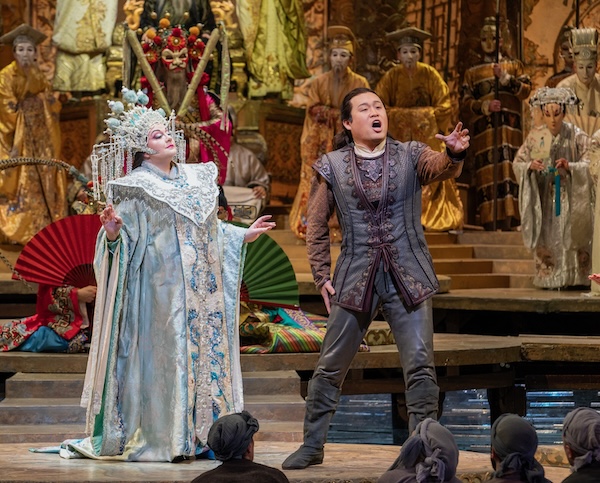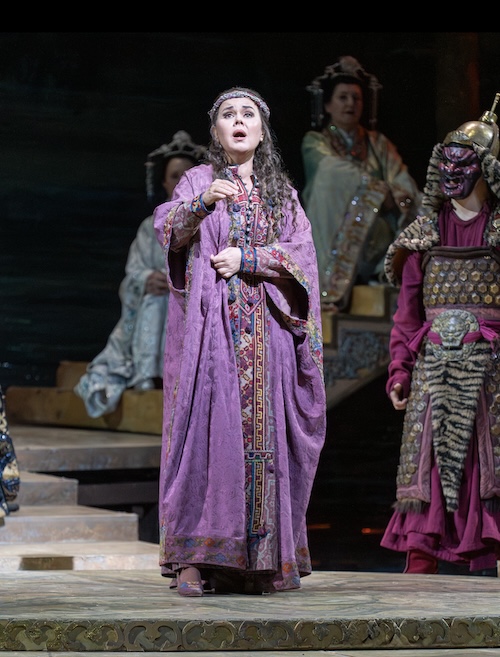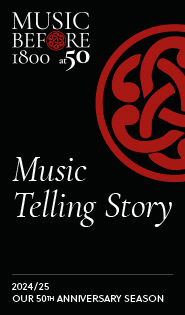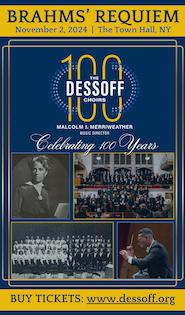Tenor, conductor strike dramatic sparks in Met’s “Turandot”

Turandot returned to the Metropolitan Opera on Wednesday evening with all of the grandeur and glitter of Franco Zeffirelli’s monumental production intact. Once or twice a temple wobbled a bit, but Imperial China was likely never as magnificent in reality as it was in the legendary Italian director’s imagination.
Two major artists made their company debuts with this performance: Russian soprano Elena Pankratova in the title role and Ukrainian conductor Oksana Lyniv. Pankratova has sung Turandot in most of the major European houses, but her much-anticipated Met debut got off to a rocky start.
As with “Nessun dorma” for the tenor, “In questa reggia” is what defines success for a Turandot. Pankratova began confidently, but there was a glitch in her voice at the crucial, low-lying point as she sang of princes traveling from far off lands that derailed it. She recovered quickly, but the impetus was lost and the aria’s climatic high notes did not ring as freely and fiercely as they should.
With the aria behind her, Pankratova displayed total vocal command of the role. Her approach runs towards the old grand manner with exaggerated gestures and icy glares, but that is par for the course. She had some particularly lovely, softer lyrical moments in the final act as she questioned Aleksandra Kurzak’s Liu and melted in the arms of SeokJong Baek’s Calàf.
In hand to hand combat with Baek, she matched him in power and vocal luster on those soaring phrases in the final scene which was no mean feat.
With Baek, the Met has found a Calàf of one’s dreams, equipped with youth, vocal power, and charisma. The Korean tenor, who began his career as a baritone, made his Met debut earlier in the season as Ismaele in Verdi’s Nabucco. Baek found the sweet spot on the top B in the final “Vincerò!” of his showpiece and while he didn’t hang on to it for an extended time, it was long enough with plenty to spare for the final high A.
Baek is much more than a one-aria wonder. As an actor, his poses are often that of an action figure, but the expressions on his face are much more subtle. Similarly, the tenor’s vocal stamina never wavered, but he also conveyed more tender emotions with great sensitivity and the sweetest of sounds. The first, but not the last, was when he sang of the smile he bestowed on a simple slave girl in “Non piangere, Liù.”
Met audiences have experienced Aleksandra Kurzak in a number of roles in the past few seasons, but her Liù is special. The soprano’s essentially lyrical voice is perfectly suited to express Liu’s love in “Signore, ascolta!” and defiance in “Tu che di gel sei cinta.”
Vitalij Kowaljow was a firm, rich-voiced Timur, even if rather lost under unflattering, overwhelming headgear. While not losing any of their zest, the antics of Joo Won Kang’s Ping, Tony Stevenson’s Pang and Andrew Stenson’s Pong were more nuanced and reflective than the usual commedia dell’arte hijinks.
Tenor Carlo Bosi was a youthful and vibrant Emperor, who may not live a thousand years, but was definitely sprier and fuller of voice than most. In the role of the Mandarin, bass-baritone Le Bu, who is in his second year in the Lindemann Young Artist Development Program and was a 2022 Grand Finals Winner of the Met’s Laffont Competition, again impressed with his imposing voice and forthright delivery.
The performance began with a surge of energy that wasn’t only due to the acrobats hurling themselves across the stage, but also the appearance of Oksana Lyniv on the podium. In 2021, she made history for being the first woman to conduct at the Bayreuth Festival with The Flying Dutchman. The following year, Lyniv became the first woman to assume the role of music director of Teatro Comunale di Bologna. This performance further cemented her reputation.
It wasn’t just the energy which she brought to the score, but also her ability to highlight its inherent lyricism. Pankratova, Baek, and Kurzak’s most touching moments were due in large part to Lyniv’s sensitivity to the music’s beauty and emotion.
The Met chorus and orchestra likewise responded to Lyniv’s command of the drama and the music. The great arias were enhanced by the chorus’s haunting, silvery sound, while the cries of triumph that greeted Calàf ’s victories rang out magnificently. As for the orchestra, whether the most transparent of playing from the strings or fabulous tutti fortissimos, they played with their usual excellence.
The ovation that greeted Lyniv when she took her solo bow was second to none at this performance.
Turandot runs through June 7 with multiple cast changes. metopera.org






Posted Mar 01, 2024 at 6:28 am by Jam Herald
Thank you for your excellent review. I’m sorry I missed it.
Posted Mar 01, 2024 at 7:51 pm by Anna Romanyschyn
What too k Met so long to invite this wonderful conductor- Oksana Lyniv to come to the Met?
Hope to see Her again and again at the Met in the future seasons.
Cheers!
Posted Mar 03, 2024 at 10:19 am by Marshall Coid
EXCELLENT REVIEW which reflected many of my impressions attending another later performance March 2. I would only have been a bit more effusive of Liu. The audience gave her a “stop-the show” ovation which may have eclipsed the conductor’s (She did a wonderful, detailed interpretation indeed) and the tenor’s (Calaf) well-deserved applause.
The orchestra and Chorus were at their best and often ravishingly beautiful/subtle and alternatively thrilling in climactic sections. I wonder if the “action-figure” acting aspect you mentioned is partly stylistic throughout the production…I would say noticeably but also enjoyably so…so much is heightened in the story (more fable-fairy tale) it seems to suit throughout.
This production remains a great operatic TREASURE for the world and I encourage ALL to make an effort to see it. We owe such a debt to Zeffirelli…ALWAYS!!!